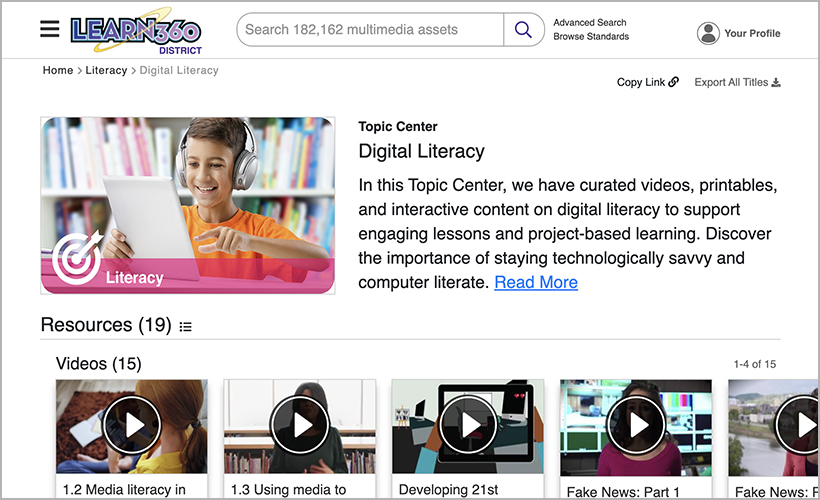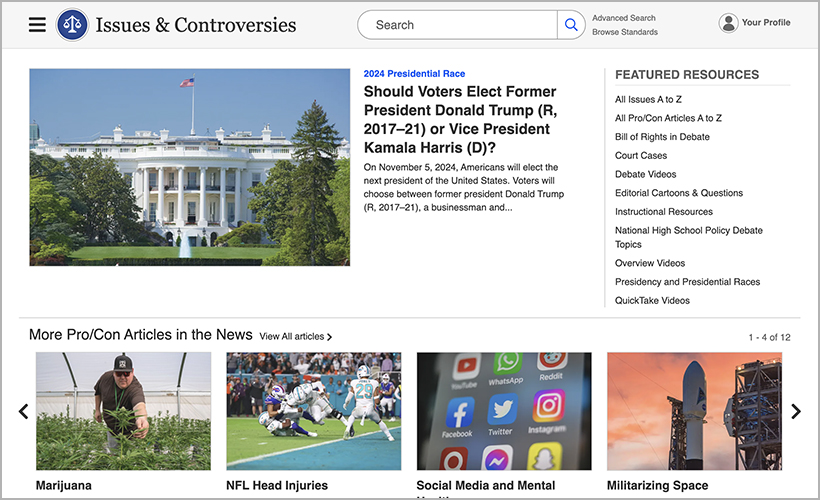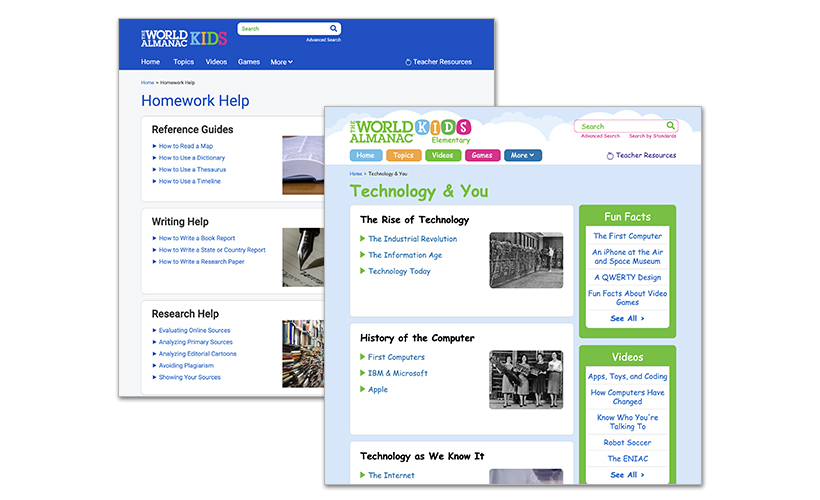Start Information Literacy Education in High School or Earlier

When should information literacy education start? While many colleges offer IL capstone courses, most experts agree it should begin in K–12. States like New Jersey, California, Delaware, and Texas now mandate information literacy instruction to teach students how to evaluate sources—from social media and news articles to textbooks.
Infobase can help. Our Information Literacy Strategy Handbook, High School Edition, provides guidance on integrating IL programs, using AI, scaffolding instruction, and promoting your program to educators and administrators.
Plus, Infobase offers award-winning databases and streaming video resources to support K–12 students in developing critical research and media literacy skills, helping them navigate today’s world of information overload.
Learn360
There are many reasons your classroom needs Learn360. Not only is Learn360 a great place to support students’ research and help them accumulate background knowledge—with more than 170,000 educator-vetted resources across a broad range of curricular and high-interest topics on a safe, ad-free platform—but it also puts content educators can use in their IL programming right at their fingertips with two Topic Centers: Digital Literacy and Media Literacy.

In these Topic Centers, you’ll find videos and other media on information literacy from trusted series and producers, including:
- Mastering the Art of Information Literacy from Motion Masters (Item #291369; for grades 9–12)
- My World Media Literacy from BBC Worldwide Learning (Item #209893; for grades 7–9)
- Internet Know How from Motion Masters (Item #208335; for grades 6–12)
- Digital Storytelling from Makematic (Item #195612; for grades 10–12)
- How to Recognize Fake News from Motion Masters (Item #145228; for grades 6–12)
- And more!
Credo Source
Many students arrive at college thinking that freely available internet resources are sufficient for academic work and that Google is a sufficient search tool—no need to check any other source. As such, one of the first steps of any IL program is to introduce students to trustworthy research resources like your library’s databases. If you’re introducing students to college-level research, Credo Source is the perfect place to start their journey. Students will find trusted reference content—including 1.5 million curated articles, images, and videos from renowned publishers and producers—plus Credo Source’s instruction-friendly platform allows for seamless integration of federated search results from your library’s licensed e-resources, which can help introduce students to more of your library’s content.
Credo Source also includes Research Skill Builders—point-of-need instructional tools for students tackling the challenges of 21st-century research. Find high-quality videos and tutorials on a wide range of topics, including:
- Inquiry and Open-Mindedness
- Digital Citizenship
- How to Narrow Your Topic
- Choosing a Database
- Visual Literacy
- Using Lateral Reading to Evaluate Sources
- News Reporting vs. Opinion Reporting
- Plagiarism
- Time Management Tips
- Preparing for a Pro/Con Debate
Educators can incorporate Research Skill Builders into in-class teaching, flipped-classroom instruction, or point-of-need support.
Issues & Controversies

Debates build critical thinking and information literacy by teaching students to weigh evidence, analyze rhetoric, and consider multiple perspectives. Issues & Controversies offers balanced pro/con articles on politics, government, business, society, education, and culture—plus related resources like infographics, court cases, editorials, podcasts, debate videos, news articles, and primary sources.
Educators can access lesson plans for class debates, speech assessment, and using editorial cartoons, while students can explore guides on evaluating sources, avoiding plagiarism, analyzing primary documents, and citing sources.
World News Digest
In an era of information overload and misinformation, World News Digest promotes news and information literacy with trusted, objective, and concise coverage of key political, economic, and cultural events.
- Featuring authoritative news summaries, editorially curated media roundups, and 80+ years of historical context, it helps students understand current and past events with clarity.
- For those studying the 2024 U.S. presidential election, the Elections Guide offers in-depth details on candidates, debates, polling, and more—making it an essential resource for analyzing bias and spotting misinformation.
The World Almanac® for Kids and The World Almanac® for Kids Elementary
Kid-friendly resources like The World Almanac for Kids Elementary and The World Almanac for Kids give students a safe, fun space to build online research skills with age-appropriate articles, videos, games, and activities on a wide range of curricular topics.
- Among the many subjects are ones that IL instructors can use to introduce information literacy at an age-appropriate level.
- The World Almanac for Kids Elementary features a “Using Technology” section that teaches kids smart online habits—covering digital etiquette, blogging, social media, critical thinking, and cyber safety.
- The World Almanac for Kids offers a Homework Help section with articles and short videos on research skills, evaluating sources, citing correctly, avoiding plagiarism, analyzing primary sources, and using online research tools. Perfect for building information literacy and research confidence.

